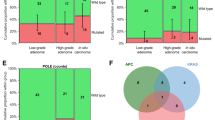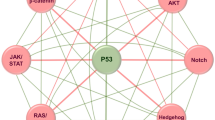Abstract
Background: In recent years, as a result of refinement in molecular biology techniques, significant progress has been made in the understanding of colorectal carcinogenesis. Particular attention has been drawn to identification of genetic mutation that may predispose to colorectal carcinoma (familial syndromes) and may affect tumor behavior and prognosis (sporadic cases).
Conclusions: Our method of topographic genotyping of human colonic carcinomas has shown a correlation between K-ras-2 and p53 mutations and stage- at diagnosis as well as long-term survival. Data from other investigators in this field confirm the importance of genetic analysis of human colorectal tumors. These findings are likely to impact management by allowing a more individualized therapeutic approach.
Similar content being viewed by others
References
Weinberg R. Oncogenes, antioncogenes and the molecular bases of multistep carcinogenesis.Cancer Res 1989;49:3713–21.
Knudson A. Antioncogenes and human cancer.Proc Natl Acad Sci USA 1993;90:10914–21.
Levine A. The tumor suppressor genes.Annu Rev Biochem 1993;62:623–51.
Koorey D, McCaughan G. Tumour suppressor genes and colorectal neoplasia.J Gastroenterol Hepatol 1993;8:174–84.
Yaremko M, Wasylyshyn M, Westbrook C, Michelassi F. Oncogenes, suppressor genes, and allele losses in colon cancer.Adv Surg 1993;26:323–32.
Fearon E. Molecular genetic studies of the adenomacarcinoma sequence.Adv Intern Med 1994;39:123–47.
Thomas G. Advances in the genetics and molecular biology of colorectal tumors.Curr Opin Oncol 1994;6:406–12.
Vogelstein B, Fearon ER, Hamilton SR, et al. Genetic alterations during colorectal tumor development.N Engl J Med 1988;319:525–32.
Fearon D, Cho K, Nigro J, et al. Identification of a chromosome 18q gene that is altered in colorectal cancers.Science 1990;247:49–56.
Fearon E, Jones P. Progressing toward a molecular description of colorectal cancer development.FASEB J 1992;6:2783.
Williams A, Browne S, Manning A, Hague A, van der Stappen JW, Parsheva C. Biological consequences of the genetic changes which occur during human colorectal carcinogenesis.Semin Cancer Biol 1993;4:153–9.
Boland C. The biology of colorectal cancer. Implications for pretreatment and follow-up management.Cancer 1993;71:4180–6.
Muleris M, Laurent-Puig P, Salmon R, Thomas G, Dutrillaux B. Chromosome 12 alterations and c-Ki-ras mutations in colorectal tumors.Cancer Genet Cytogenet 1993;69:161–2.
Blondal J, Benchimol S. The role of p53 in tumor progression.Semin Cancer Biol 1994;5:177–86.
Rao A, Kagan A, Chan P, Gilbert H, Nussbaum H, Hintz B. Patterns of recurrence following curative resection alone for adenocarcinoma of the rectum and sigmoid colon.Cancer 1981;48:1492–5.
Rich T, Gunderson LL, Lew R, Galdibini JJ, Cohen AM, Donaldson G. Patterns of recurrence of rectal cancer after potentially curative surgery.Cancer 1983;52:1317–29.
Pipas J, Pogue-Geile K, Finley G, Cartwright CA, Meiesler AI. Gene structure and expression in colorectal cancer.Adv Exp Med Biol 1993;330:67–75.
Chapuis P, Dent O, Fisher R, et al. A multivariate analysis of clinical and pathological variables in prognosis after resection of large bowel cancer.Br J Surg 1985;72:698–702.
Shepherd N, Saraga E, Love S, Jass J. Prognostic factors in colonic cancer.Histopathology 1989;14:613–20.
Giaretti W, Danova M, Geido E, et al. Flow cytometric DNA index in the prognosis of colorectal cancer.Cancer 1991;67:1921–7.
Bauer KD, Bagwell CB, Giaretti W, et al. Consensus review of the clinical utility of DNA flow cytometry in colorectal cancer.Cytometry 1993;14:86–91.
Hackford A. Biochemical markers for colorectal cancer. Diagnostic and therapeutic implications.Surg Clin North Am 1993;73:85–102.
Niv Y. Mucin and colorectal cancer metastasis.Am J Gastroenterol 1994;89:665–9.
Bottger T, Potratz D, Stockle M, Wellek S, Klupp J, Junginger T. Prognostic value of DNA analysis in colorectal carcinoma.Cancer 1993;72:3579–87.
Minsky B, Mies C, Rich T, Recht A. Lymphatic vessel invasion is an independent prognostic factor for survival in colorectal cancer.Int J Radiat Oncol Biol Phys 1989;17:311–8.
Radinsky R. Paracrine growth regulation of human colon carcinoma organ-specific metastasis.Cancer Metast Rev 1993;12:345–61.
Kane K. The genetics of colorectal carcinoma.Ann Clin Lab Sci 1994;24:287–93.
Wallich R, Bulbuc N, Hammerling G, Katzav S, Segal S, Feldman M. Abrogation of metastatic properties of tumour cells by de novo expression of H-2K antigens following H-2 gene transfection.Nature 1985;315:301–5.
Folkman J, Klagsburn M. Angiogenetic factors.Science 1989;339:58–60.
Cordon-Cardo C, Fuks Z, Drobnjak M, Moreno C, Eisenbach L, Feldman M. Expression of HLA-A, B, C antigens on primary and metastatic tumor cell populations of human carcinomas.Cancer Res 1991;51:6372–80.
Murakami R, Tsukuma H, Kanamori S, et al. Natural history of colorectal polyps and the effect of polypectomy on occurrence of subsequent cancer.Int J Cancer 1990;46:159–64.
Hamilton S. The adenoma-adenocarcinoma sequence in the large bowel: variations on a theme.J Cell Biochem 1992;16G:41–6.
Scott R, Muller H. Familial and genetic aspects of colorectal carcinogenesis.Eur J Cancer 1993;29A:2163–7.
Tudek B, Bird R, Bruce W. Foci of aberrant crypts in the colon of mice and rats exposed to carcinogens associated with foods.Cancer Res 1989;49:1236–40.
Kinzler K, Nilbert M, Su L, et al. Identification of FAP locus genes from chromosome 5q21.Science 1991;253:661–5.
Nakamura Y. The role of the adenomatous polyposis coli APC gene in human cancers.Adv Cancer Res 1993;62:65–87.
Nishisho I, Nakamura Y, Miyoshi Y, et al. Mutations of chromosome 5q21 genes in FAP and colorectal cancer patients.Science 1991;253:665–9.
Nagase H, Nakamura Y. Mutations of the APC (adenomatous polyposis coli) gene.Hum Mutat 1993;2:425–34.
Lynch HT, Schuelke GS, Kimberling WJ, et al. Hereditary non-polyposis colorectal cancer (Lynch syndromes I and II) biomarker studies.Cancer 1985;56:939–51.
Lynch H, Smyrk T, Watson P, et al. Genetics, natural history, tumor spectrum, and pathology of hereditary nonpolyposis colorectal cancer: an updated review.Gastroenterology 1993;104:1535–49.
Lynch H, Lynch J. The Lynch syndromes [Review].Curr Opin Oncol 1993;5:687–96.
Fishel R, Lescoe K, Rao M, et al. The human mutator gene homolog MSH2 and its association with hereditary nonpolyposis colon cancer.Cell 1993;75:1027–38.
Leach F, Nicolaides N, Papadopoulos N, et al. Mutations of a mutS homolog in hereditary nonpolyposis colorectal cancer.Cell 1993;75:1215–25.
Bronner C, Baker S, Morrison P, et al. Mutation in the DNA mismatch repair gene homologue hMLH1 is associated with hereditary nonpolyposis colon cancer.Nature 1994;368:258–61.
Papadopoulos N, Nicolaides N, Wei Y, et al. Mutation of a mutL homolog in hereditary colon cancer.Science 1994;263:1625–9.
Barbacid M. ras genes.Annu Rev Biochem 1987;56:779–827.
Bos J. ras oncogene in human cancer: a review.Cancer Res 1989;49:4682–9.
Bos J, Fearon E, Hamilton S, et al. Prevalence of ras gene mutations in human colorectal cancers.Nature 1987;327:293–7.
Losi L, Benhattar J, Costa J. Stability of k-ras mutations throughout the natural history of human colorectal cancer.Eur J Cancer 1992;28:1115–20.
Vogelstein B, Fearon E, Kern S, et al. Allelotype of colorectal carcinomas.Science 1989;244:207–11.
Bell S, Scott N, Cross D, et al. Prognostic value of p53 overexpression and c-Ki-ras gene mutations in colorectal cancer.Gastroenterology 1993;104:57–64.
Alitalo K, Schwab M, Linn C, Varmus HE, Bishop JM. Homogeneously staining chromosomal regions contain amplified copies of an abundantly expressed cellular oncogene (c-myc) in malignant neuroendocrine cells from a human colon carcinoma.Proc Natl Acad Sci USA 1983;80:1707–11.
D'Emilia J, Bulovas K, D'Ercole D, Wolf B, Stelle GJ, Summerhayes IC. Expression of the c-erbB-2 gene product (P-185) at different stages of neoplastic progression in the colon.Oncogene 1989;4:1233–9.
Melhem M, Meisler A, Finley G, et al. Distribution of cells expressing myc proteins in human colorectal epithelium, polyps, and malignant tumors.Cancer Res 1992;52:5853–64.
Heider K-H, Dammrich J, Skroch-Angel P, et al. Differential expression of CD44 splice variants in intestinal- and diffuse-type human gastric carcinomas and normal gastric mucosa.Cancer Res 1993;53:4197–203.
Cooper DL, Dougherty GJ. To metastasize or not? A question of CD44 splice site selection.Nature Med News Views (in press).
Kim H, Yang X-L, Rosada C, Hamilton SR, August JT. CD44 expression in colorectal adenomas is an early event occurring prior to K-ras and p53 gene mutation.Arch Biochem Biophys 1994;310:504–7.
Winawer S, Zauber A, O'Brien M, et al. The National Polyp Study: design, methods and characteristics of patients with newly diagnosed polyps.Cancer 1992;70:1236–45.
Fearon EF, Vogelstein B. A genetic model for colorectal tumorigenesis.Cell 1990;61:759–67.
Hedrick L, Cho K, Fearon E, et al. The role of the DCC gene in colorectal tumorigenesis.Cancer Res Clin 1992;1:90.
Peltomaki P, Sistonen P, Mecklin J, et al. Evidence supporting exclusion of the DCC gene and a portion of chromosome 18q as the locus for susceptibility to hereditary nonpolyposis colorectal carcinomas in five kindreds.Cancer Res 1991;51:4135–40.
Harris C, Hollstein M. Clinical implications of the p53 tumor suppressor gene.N Engl J Med 1993;329:1318–27.
Baker SJ, Fearon ER, Nigro JM, et al. Chromosome 17 deletions and p53 gene mutations in colorectal carcinomas.Science 1989;244:217–21.
Meling G, Lothe R, Borresen A, et al. The TP53 tumour suppressor gene in colorectal carcinomas—genetic alterations on chromosome 17.Br J Cancer 1993;67:88–92.
Prives C, Manfredi J. The p53 tumour suppressor protein: meeting review.Genes Dev 1993;7:529–34.
Baker S, Markowitz S, Fearon E, Wilson J, Vogelstein B. Suppression of human colorectal cell growth by wild type p53.Science 1990;249:12–5.
Hollstein M, Sidransky D, Vogelstein B, Harris C. p53 mutations in human cancers.Science 1991;253:49–53.
Levine A, Mornand J, Finlay C. The p53 tumour suppressor gene.Nature 1991;351:455–6.
Malkin D, Li F, Strong L, Fraumeni JF, Nelson LE, Kim DH. Germ line p53 mutations in a familial syndrome of breast cancer, sarcomas, and other neoplasms.Science 1990;250:1233–8.
Bartek J, Bartkova J, Vojtesen B, et al. Aberrant expression of the p53 oncoprotein is a common feature of a wide spectrum of human malignancies.Oncogene 1991;6:1699–703.
Baker S, Preisinger A, Jessup J, et al. p53 gene mutations occur in combination with 17p allelic deletions as late events in colorectal tumorigenesis.Cancer Res 1990;50:7717–22.
Jen J, Kim H, Piantadosi S, et al. Allelic loss of chromosome 18q and prognosis in colorectal cancer.N Engl J Med 1994;331:213–21.
Laurent-Puig P, Olschwang S, Delattre O, et al. Survival and acquired genetic alterations in colorectal cancer.Gastroenterology 1992;102:1136–41.
Young J, Buttonshaw R, Butterworth L, et al. Association of the SS genotype of the L-myc gene and loss of 18q sequences with a worse clinical prognosis in colorectal cancers.Oncogene 1994;9:1053–6.
Bosari S, Viale G, Bossi P, et al. Cytoplasmic accumulation of p53 protein: an independent prognostic indicator of colorectal adenocarcinomas.JNCI 1994;86:681–7.
Finkelstein SD, Sayegh R, Bakker A, Swalsky P. Determination of tumor aggressiveness in colorectal cancer by K-ras-2 analysis.Arch Surg 1993;128:526–32.
Pricolo VE, Finkelstein SD, Wu T-T, et al. Prognostic value of TP53 and K-ras-2 mutational analysis in stage III carcinoma of the colon.Am J Surg 1996;171:1–6.
Boughdady A, Kinsella A, Haboubi N, Schofield P. K-ras gene mutations in colorectal adenomas and carcinomas from familial adenomatous polyposis patients.Surg Oncol 1992;1:269–74.
McLellan A, Owen R, Stepniewska K, et al. High frequency of K-ras mutations in sporadic colorectal carcinomas.Gut 1993;34:392–6.
Vivona AA, Shpitz B, Medline A, et al. K-ras mutations in aberrant crypt foci, adenomas and adenocarcinomas during azoxymethane-induced colon carcinogenesis.Carcinogenesis 1993;14:1777–81.
Chaubert P, Benhattar J, Saraga E, Costa J. K-ras mutations and p53 alterations in neoplastic and nonneoplastic lesions associated with longstanding ulcerative colitis.Am J Pathol 1994;144:767–75.
Finkelstein SD, Sayegh R, Christensen S, Swalsky PA. Genotypic classification of colorectal adenocarcinoma.Cancer 1993;71:3827–38.
Finkelstein SD, Przygodski R, Pricolo V, et al. K-ras-2 topographic genotyping of pancreatic adenocarcinoma.Arch Surg 1994;129:367–73.
Reinvikos Y, Tominaga O, Hammel P, et al. Increased p53 protein content of colorectal tumours correlates with poor survival.Br J Cancer 1992;66:758–64.
McKenna W, Weiss M, Bakanauskas V, et al. The role of the H-ras oncogene in radiation resistance and metastasis.Int J Radiat Oncol Biol Phys 1990;18:849–59.
Niimi S, Nagakawa K, Yokota J, et al. Resistance to anticancer drugs in NII-13T3 cells transfected with c-myc and/or c-H-ras genes.Br J Cancer 1991;63:237–41.
Sidransky D, Tokino T, Hamilton S, et al. Identification of ras oncogene mutations in the stool of patients with curable colorectal tumors.Science 1992;256:102–5.
Roth J. Modulation of oncogene and tumor-suppressor gene expression: a novel strategy for cancer prevention and treatment.Ann Surg Oncol 1994;1:79–86.
Coburn M, Pricolo V, DeLuca F, Bland K. Malignant potential in intestinal juvenile polyposis syndromes.Ann Surg Oncol 1995;2:386–91.
Author information
Authors and Affiliations
Rights and permissions
About this article
Cite this article
Pricolo, V.E., Finkelstein, S.D. & Bland, K.I. Topographic genotyping of colorectal carcinoma: From a molecular carcinogenesis model to clinical relevance. Annals of Surgical Oncology 4, 269–278 (1997). https://doi.org/10.1007/BF02306621
Received:
Accepted:
Issue Date:
DOI: https://doi.org/10.1007/BF02306621




